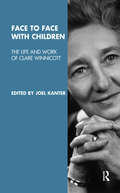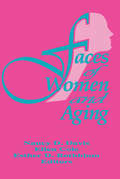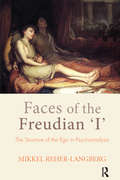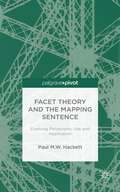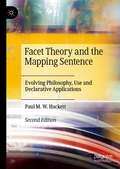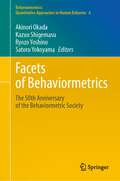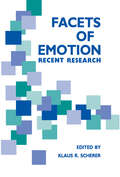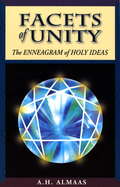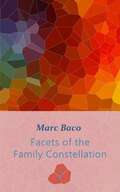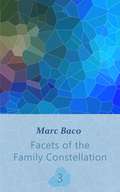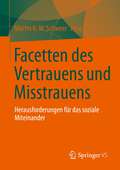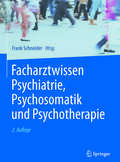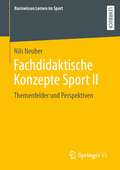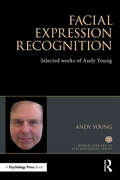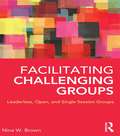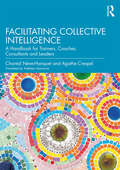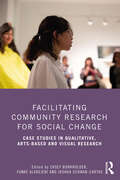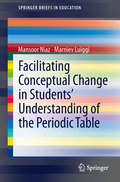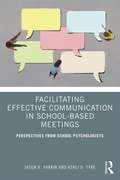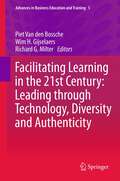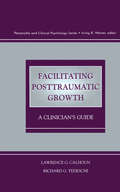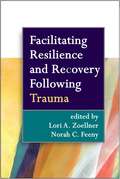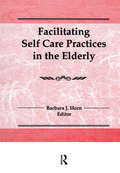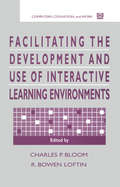- Table View
- List View
Face to Face with Children: The Life and Work of Clare Winnicott
by Joel KanterThis book presents the life and work of one of the leading British social workers of the 20th century. The wife of Donald Winnicott, an analysand of Melanie Klein, a wartime innovator in helping evacuated children, a teacher and mentor to a generation of British social workers and a gifted psychoanalyst, Clare Winnicott's life encompassed a remarkable richness of relationships and accomplishments.
Face to Face with Emotions in Health and Social Care
by Benjamin GrayThis book draws from the everyday experiences as well as the harsh realities confronting behavioral care providers on the frontline. The book recounts the stories and sometimes disturbing emotions of people whose lives have undergone sudden change or even drastic trauma; people whose feelings of comfort and safety have been shattered by exposure to illness, abuse, death and bereavement. The perspectives and experiences of nurses, social care staff, patients, children and families are at the core of understanding the importance, challenges and therapeutic vitality of emotions. The 55 individuals on the frontline who took part in the interviews on which this study is based discuss the emotions associated with care in mental health, pediatric oncology, AIDS/HIV, as well as child protection and abuse, racism, refugee exile, poverty, and social exclusion. Their bravery, openness, and ability to communicate and share their emotions make this book possible.
Faces of Women and Aging
by Ellen Cole Esther D Rothblum Nancy C DavisDiscover the diverse ways aging women attempt to deal with the universal challenges of loss, sickness, and death along with the problems of being old women in a society that values women mainly as sexual partners or producers of children. Old women are often seen as poor, powerless, and pitiful in our sexist and youth-oriented society. The truth is that women age much more successfully than do men and they are increasingly in the majority as our population ages. These truths and others are presented in Faces of Women and Aging--a collection written by women, a number of whom are themselves older women who bring their unique life experiences and personalities to the topic.This uplifting book emphasizes that middle and old age are merely stages of growth and development, not just seasons of loss and decline as the end approaches. A wealth of topics are covered in Faces of Women and Aging that broaden the reader’s awareness of the problems of women and aging including: how to maintain self-esteem in the face of sexism, ageism, and severe illness the problems of being single or divorced in the later years the problems of maintaining a good body image for older women in a society which values the young and the beautiful the additional difficulties of minority women, specifically lesbians and native American women increased dependency brought on by illness and loss of partners Faces of Women and Aging combines personal narratives that serve as reminders of the human beings behind statistics and case studies with theoretical observations which help therapists assist older women cope with the daily hardships as well as the more catastrophic problems of aging.
Faces of the Freudian I: The Structure of the Ego in Psychoanalysis
by Mikkel Reher-LangbergI would like to thank Judy Gammelgaard and Andrew Moskowitz for their encouragement, critique, and confidence in me, without which I could not have undertaken the present study. I also wish to thank Jon Frederickson for his generous editorial suggestions, and for his writings, which stimulated my interest in the ego in the first place. Last but not least, I want to thank my friend Joachim Meier for our tireless discussions on subjectivity—a continual source of vitality and inspiration during the years of this book’s conception.
Facet Theory and the Mapping Sentence: Evolving Philosophy, Use and Application
by Paul M.W. HackettHow do we think about the worlds we live in? The formation of categories of events and objects seems to be a fundamental orientation procedure. Facet theory and its main tool, the mapping sentence, deal with categories of behavior and experience, their interrelationship, and their unification as our worldviews. In this book Hackett reviews philosophical writing along with neuroscientific research and information form other disciplines to provide a context for facet theory and the qualitative developments in this approach. With a variety of examples, the author proposes mapping sentences as a new way of understanding and defining complex behavior.
Facet Theory and the Mapping Sentence: Evolving Philosophy, Use and Declarative Applications
by Paul M.W. HackettThis book is the second edition of Facet Theory and the Mapping Sentence: Evolving Philosophy, Use and Application (2014). It consolidates the qualitative and quantitative research positions of facet theory and delves deeper into their qualitative application in psychology, social and the behavioural sciences and in the humanities. In their traditional quantitative guise, facet theory and its mapping sentence incorporate multi-dimensional statistics. They are also a way of thinking systematically and thoroughly about the world. The book is particularly concerned with the development of the declarative mapping sentence as a tool and an approach to qualitative research. The evolution of the facet theory approach is presented along with many examples of its use in a wide variety of research domains. Since the first edition, the major advance in facet theory has been the formalization of the use of the declarative mapping sentence and this is given a prominent position in the new edition. The book will be compelling reading for students at all levels and for academics and research professionals from the humanities, social sciences and behavioural sciences.
Facets of Behaviormetrics: The 50th Anniversary of the Behaviormetric Society (Behaviormetrics: Quantitative Approaches to Human Behavior #4)
by Akinori Okada Kazuo Shigemasu Satoru Yokoyama Ryozo YoshinoThis edited book is the first one written in English that deals comprehensively with behavior metrics. The term “behaviormetrics” comprehends the research including all sorts of quantitative approaches to disclose human behavior. Researchers in behavior metrics have developed, extended, and improved methods such as multivariate statistical analysis, survey methods, cluster analysis, machine learning, multidimensional scaling, corresponding analysis or quantification theory, network analysis, clustering, factor analysis, test theory, and related factors. In the spirit of behavior metrics, researchers applied these methods to data obtained by surveys, experiments, or websites from a diverse range of fields. The purpose of this book is twofold. One is to represent studies that display how the basic elements of behavior metrics have developed into present-day behavior metrics. The other is to represent studies performed mainly by those who would like to pioneer new fields of behavior metrics and studies that display elements of future behavior metrics. These studies consist of various characteristics such as those dealing with theoretical or conceptual subjects, the algorithm, the model, the method, and the application to a wide variety of fields. This book helps readers to understand the present and future of behavior metrics.
Facets of Emotion: Recent Research
by Klaus R. SchererFirst published in 1988. Routledge is an imprint of Taylor & Francis, an informa company.
Facets of Unity: The Enneagram of Holy Ideas
by A. H. AlmaasFacets of Unity presents the Enneagram of Holy Ideas as a crystal clear window on the true reality experienced in enlightened consciousness. Here we are not directed toward the psychological types but the higher spiritual realities they reflect. We discover how the disconnection from each Holy Idea leads to the development of its corresponding fixation, thus recognizing each types deeper psychological core. Understanding this core brings each Holy Idea within reach, so its spiritual perspective can serve as a key for unlocking the fixation and freeing us from its limitations.
Facets of the Family Constellation -- Volume 2
by Marc BacoThis is a highly readable guide to the powerful family constellations method of therapy, which is based on recreating family patterns within the therapeutic context.
Facets of the Family Constellation -- Volume 3: N.A. (Volume 3 #3)
by Marc BacoThis is a highly readable guide to the powerful family constellations method of therapy, which is based on recreating family patterns within the therapeutic context.
Facetten des Vertrauens und Misstrauens: Herausforderungen für das soziale Miteinander
by Martin K. W. SchweerDer Band stellt den aktuellen Forschungsstand zu dem gesellschaftlich hochrelevanten Themenkomplex um Vertrauen und Misstrauen zusammen. In Forschung und Transfer zeigt sich, welche wertvollen Beiträge die diesbezügliche Forschung leistet, wenn es um die Lösung konkreter sozialer Probleme und um die Bewältigung gesellschaftlicher Herausforderungen geht.
Facharztwissen Psychiatrie, Psychosomatik und Psychotherapie
by Frank SchneiderFür die effiziente Vorbereitung auf die Facharztprüfung in Psychiatrie und Psychotherapie ist die 2. Auflage des "Facharztwissen" optimal geeignet. Die Neuauflage wurde gründlich überarbeitet und aktualisiert. Die Kapitel zu psychosomatischen Störungen wurden deutlich ausgebaut. Die bewährte stichwortartige und knappe Darstellung der wichtigsten Inhalte wurde beibehalten - zahlreiche Schemata, Algorithmen, Abbildungen und Tabellen deinen der schnellen Orientierung im Text. Inhaltlich umfasst das Werk alles, was man wissen muss - von Leitsymptomen über Untersuchungsmethoden bis hin zu allen Krankheitsbildern, Notfällen, transkultureller Psychiatrie, Unterbringung und Begutachtung.
Fachdidaktische Konzepte Sport II: Themenfelder und Perspektiven (Basiswissen Lernen im Sport)
by Nils NeuberDas Lehrbuch gibt eine Übersicht über fachdidaktische Konzepte im Bereich der Entscheidungsfelder von Bewegungs-, Spiel- und Sportangeboten für Kinder und Jugendliche. Einleitend wird ein Überblick über allgemeine fachdidaktische Konzepte gegeben. Den Schwerpunkt bilden spezielle Konzepte zu Themenfeldern und Perspektiven des Sportunterrichts. Der Aufbau orientiert sich an den sechs Pädagogischen Perspektiven Eindruck, Ausdruck, Wagnis, Leistung, Soziales und Gesundheit.
Facial Expression Recognition: Selected works of Andy Young (World Library of Psychologists)
by A W YoungIn the World Library of Psychologists series, international experts themselves present career-long collections of what they judge to be their finest pieces - extracts from books, key articles, salient research findings, and their major theoretical and practical contributions. This volume of self-selected papers recognises Andy Young’s major contribution to the study of face perception, for which he received the BPS Lifetime Achievement Award in 2013. Focusing on his work in facial expression recognition, a specially written introduction gives an overview of his work and contextualises the selection in relation to developments in the field during this time. Divided into five distinct sections, the book covers work on both theoretical and experimental approaches to facial expression recognition, neuropsychology, functional brain imaging, and applications of research. This book will be of great interest to students and researchers of cognitive psychology or neuropsychology interested in face perception. It will also appeal to those with an interest in the highly varied applications of the research and provide insight into a number of clinical disorders.
Facilitating Challenging Groups: Leaderless, Open, and Single-Session Groups
by Nina W. BrownGroups—like the people in them—come in all forms, and often they don’t fit a standard mold. Single-session, leaderless, and open groups are three of the most common kinds of nonstandard groups, but participants and facilitators of these kinds of groups have few, if any, resources at their disposal when they try to confront the unique challenges that their group structures present. Facilitating Challenging Groups confronts these challenges head on and offers activities, tools, tips, and techniques vital to everyone from the smallest self-help group to the largest human-relations training session. Readers will come away from this book with a deep understanding of each group’s unique needs, the leader’s role where applicable, and concrete strategies for developing the two traits most important to any successful group: universality and hope.
Facilitating Collective Intelligence: A Handbook for Trainers, Coaches, Consultants and Leaders
by Chantal Nève-Hanquet Agathe CrespelChantal Nève-Hanquet and Agathe Crespel provide an accessible and ground-breaking guide to genuinely effective group work, sharing excellent hands-on assistance for coaches and facilitators. Offering a unique selection of guidelines and illustrations for group work, the authors demonstrate the benefits of using creative action methods in practice, helping leaders discover new ways to achieve dynamic group sessions and endowing their work with new vigour, as well as pleasure. Facilitating Collective Intelligence brings together a wealth of knowledge and techniques from psychodrama, Jungian and systemic analysis to inform group facilitation. Throughout the book's four parts, key inner attitudes, questions and action techniques are explored to help facilitators nourish open and flexible forms of communication within groups, stimulate collective intelligence and foster creative approaches to collective problem-solving. With the help of numerous sensitively related case studies, the book guides the reader through the process of achieving more dynamism in group work, fostering creativity, encouraging agility and developing co-construction within groups. It contains more than thirty practical reference sheets which provide an instant aid for implementing the methods and models in the book. Nève-Hanquet and Crespel’s approach advocates the use of actions methods, specifically the ARC model, to encourage 'out of the box' thinking and develop new paths and strategies in working with teams and organizations. Facilitating Collective Intelligence is an invaluable and essential tool in cultivating effective group dynamics for all coaches, coach supervisors and consultants, both experienced and in training. Due to its clear and practical structure, it will also be useful for counsellors, coaching psychologists and other professionals who work with groups, as well as students and academics of coaching and coaching psychology.
Facilitating Community Research for Social Change: Case Studies in Qualitative, Arts-Based and Visual Research
by Casey Burkholder Joshua Schwab-Cartas Funké AladejebiFacilitating Community Research for Social Change asks: what does ethical research facilitation look like in projects that seek to move toward social change? How can scholars weave political and social justice through multiple levels of the research process? This edited collection presents chapters that investigate research facilitation in ways that specifically attempt to disrupt and challenge anti-Indigenous and anti-Black racism, ableism, homophobia, transphobia, patriarchy, and sexism to work toward social change. It also explores what it means to develop facilitation practices across multiple contexts and research settings, including specific facilitation methods considered by researchers working with visual and community-based methods with Black, Indigenous, and racialized communities. The complexities of how scholars negotiate decisions within their research with people and communities have an effect not only on how researchers construct their participants and communities, but also on the overall purpose of projects, the ways their projects are shared and disseminated, and what is learned in the doing of facilitation. This book will be of great interest to both emerging and established researchers working within the social sciences. It specifically attends to diverse fields within the social sciences that include health, media studies, environmental studies, social work, sociology, education, participatory visual research methodologies, as well as the evolving field of digital humanities.
Facilitating Conceptual Change in Students’ Understanding of the Periodic Table
by Mansoor Niaz Marniev LuiggiThis book is about how students are taught the periodic table. It reviews aspects of the periodic table's development, using the history and philosophy of science. The teaching method presented in this book is ideal for teaching the subject in high school and at introductory university level. Chemistry students taught in this new, experimental way are compared with those taught in the traditional way and the author describes how tests found more conceptual responses from the experimental group than the control group. The historical aspects of importance to this teaching method are: the role of the Karlsruhe Congress of 1860; the accommodation of the chemical elements in the periodic table; prediction of elements that were discovered later; corrections of atomic weights; periodicity in the periodic table as a function of the atomic theory; and the accommodation of argon. The experimental group of students participated in various activities, including: discussion of various aspects related to the history and philosophy of science; construction of concept maps and their evaluation by the students; PowerPoint presentations; and interviews with volunteer students.
Facilitating Effective Communication in School-Based Meetings: Perspectives from School Psychologists
by Jason R. Parkin Ashli D. TyreThis book offers guidance for school-based professionals participating in the special education process. It provides a foundation for effective oral communication and meeting facilitation in team meetings while highlighting methods to enhance collaboration between educators and families. School psychologists across the United States share how they structure meetings, provide examples for how to communicate educational and psychological concepts, and describe personas they present to support the meeting process. Chapters present a sequential facilitation process for school psychologist-led meetings and apply that process to problem-solving, suspicion of disability, eligibility/feedback, IEP, and manifestation determination meetings. Within each chapter, featured practitioners describe ways to address common challenges that arise. Aimed at graduate students and professionals, this text is a unique, example-based resource to enhance readers’ ability to facilitate and participate in the special education process.
Facilitating Learning in the 21st Century: Leading through Technology, Diversity and Authenticity
by Wim H. Gijselaers Piet Van den Bossche Richard G. MilterThis book tackles the latest challenges in education in the business sector, outlining how the students of the future must be taught to adapt to a highly fluid business environment in which their ability to acquire new skills and collaborate with others is more important than possessing facts. Taking its cue from the growing body of theory advocating multi-faceted and often multilingual education, the book focuses on 'competences' and collaborative, team-oriented, project-based learning. Beginning with a set of studies on the differences in individual learning and ways of supporting students, the volume moves on to a collection of papers on learning at the level of the group, which include material on team learning, and the sharing of knowledge in problem-based learning. The editors view these factors in education as an inevitable feature of pedagogy, reflecting the fact that knowledge, and its acquisition, is increasingly collaborative in our working lives, and especially in business. A final section applies the principles developed in the first two parts at an organizational level, evaluating the enormous implications these developments in our ideas about learning have for the educational institutions charged with teaching future generations. Combining research and theory with practical factors in business education and training, the volume provides wide-ranging perspectives on developing best practice in the sector.
Facilitating Posttraumatic Growth: A Clinician's Guide
by Lawrence G. Calhoun Richard G. TedeschiIn this book, Calhoun and Tedeschi construct the first systematic framework for clinical efforts to enhance the processes they sum up as posttraumatic growth. Posttraumatic growth is the phenomenon of positive change through struggle with even the most horrible sets of circumstances. People who experience it tend to describe three general types of change: realistically stronger feelings of vulnerability that are nonetheless accompanied by stronger feelings of personal resilience, closer and deeper relationships with others, and a stronger sense of spirituality. Posttraumatic growth has only recently become an important focus of interest for researchers and practitioners. Drawing on a burgeoning professional literature as well as on their own extensive clinical experience, the authors present strategies for helping clients effect all three types of positive change--strategies that have been tested in a variety of groups facing a variety of crises and traumas. Their concise yet comprehensive practical guide will be welcomed by all those who counsel persons grappling with the worst life has to offer.
Facilitating Resilience and Recovery Following Trauma
by Lori A. Zoellner Norah C. FeenyThis volume synthesizes cutting-edge research on natural processes of resilience and recovery, highlighting implications for trauma treatment and prevention. Prominent experts examine what enables many trauma survivors to heal over time without intervention, as well what causes others to develop long-term psychiatric problems. Identifying key, modifiable risk and resilience factors--such as cognitions and beliefs, avoidance, pain, and social support--the book provides recommendations for when (and when not) to intervene to promote recovery. Illustrative case examples are included. A section on specific populations discusses children, military personnel, and low socioeconomic status or marginalized communities.
Facilitating Self Care Practices in the Elderly
by Barbara J HornThis book is a synthesis of current knowledge from published sources and expert consultants relating to three commonly occurring problems in home health care practice--self-administration of medications, family caregiving issues, and teaching the elderly. For each problem addressed, assessment guides and interventions are outlined, making this book an invaluable resource for professionals, researchers, and agencies concerned with providing top-quality care for the elderly. Home health care agencies can use the guide for orientation of new staff and inservice education for current staff. Home health care staff can use many of the assessment guides and resource lists in their work with clients. Facilitating Self Care Practices in the Elderly can also serve as a basis for standard development. Researchers interested in these clinical problems will find that the literature review and synthesis will facilitate the development of the theoretical underpinning for their research. Educators will find the book helpful in courses and as a basis for curriculum development. First Published in 1990. Routledge is an imprint of Taylor & Francis, an informa company.
Facilitating the Development and Use of Interactive Learning Environments
by CHARLES P. BLOOM; R. BOWEN LOFTINIntelligent tutoring technology is on the verge of a breakthrough into the mainstream of training and education. Over the past 25 years, researchers have learned not only what it takes to develop an effective intelligent tutoring system (ITS), but also what it takes to deploy and use one--the true barometer of a technology's success. This volume brings together a cross-section of ITS researchers from academia, industry, and the government to talk about their experiences in ITS development and technology transfer, both successful and unsuccessful. Section 1 is devoted to detailed descriptions of tools and methods ITS developers can employ during development to facilitate technology adoption. It includes discussions of the paradigmatic change in learning and instructional design that ITS fosters, techniques for gathering design information for ITS domains where empirical or knowledge-based methods are inappropriate, and the conduct of cost-benefits analyses to facilitate ITS funding decisions. Sections 2 and 3 offer numerous case studies of ITS deployment from both industry and the government. All of these case studies--regardless of outcome--provide valuable insights into the dos and don'ts of ITS technology transfer. This volume will be an invaluable resource for all researchers and developers of ITS, as well as for managers and personnel in education and training organizations who must adopt and use ITS technology, and information systems and computing support organization professionals who must support it if it is to succeed.
